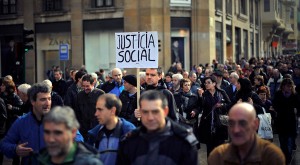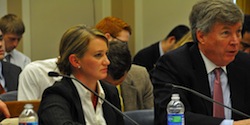Across the World, Leaders Brace for Discontent and Upheaval
DAVOS, Switzerland — Protesters in Moscow and Cairo fill public squares to demand representative government. Yet on the streets of Madrid and New York — or of Athens, which gave us the very word for democracy — discontent is almost as rampant.

Protesters angry over proposed budget cuts took to the streets of Pamplona, Spain, last week. World leaders now meeting in Switzerland face difficult choices
The only consistent messages seem to be that leaders around the world are failing to deliver on their citizens’ expectations and that Facebook, Twitter and other social media tools allow crowds to coalesce at will to let them know it. This is not a comforting picture for the 40 heads of state or leaders of governments who are attending the World Economic Forum here, including such disparate leaders as Chancellor Angela Merkel of Germany’s multiparty democracy or Meles Zenawi, the prime minister of the authoritarian state of Ethiopia.
“I think that what we have learned in the last few years since the financial crisis and since the Arab Spring is that brittle states with limited political and economic capital are particularly susceptible to the combination of severe economic downturn and the communications revolution,” said Ian Bremmer, the president of Eurasia Group, a political risk consulting firm in New York.
“Those brittle states come in different flavors,” said Mr. Bremmer, who moderated a panel in Davos on Wednesday on the state of democracy. “Some are authoritarian, some of them are democratic.”
In raw statistical terms, democracy lost ground last year, according to the annual tally by Freedom House, an advocacy group in Washington. In a report issued last week, Freedom House counted 12 countries where democracy had made gains and 26 where the level of freedom had declined.
At the same time, the Arab Spring revolts in Egypt, Tunisia and other Middle Eastern countries showed democratic progress.
“Our view is that the events of 2011 are more positive than negative,” said Arch Puddington, the vice president for research at Freedom House. “We see the Arab uprising as constituting the kind of transformational event not unlike in 1989 and 1991 when the Soviet Union unraveled. It is a part of the world that has been immune to the spread of freedom. Now things are in play.”
No one can predict with confidence what kind of societies will emerge from the turmoil. The superiority of American and European democracy no longer seems as clear-cut as it did a decade ago. Political views in the United States are polarized, and public confidence in Congress is at a low level. The euro zone debt crisis drags on as European leaders quarrel endlessly about how to solve it.
The most powerful leader in Europe may be Mario Draghi, president of the European Central Bank, who was appointed by elected officials but cannot be fired and is independent of political control. So it is telling that in a city full of banks, the Frankfurt version of the Occupy movement chose the central bank’s lawn as a place to set up its tents. Participants said they were protesting its lack of democratic accountability. Meanwhile, Greece and Italy are led by unelected technocrats whose selections were strongly influenced by Germany.
Vast numbers of people in many countries seem tired and disillusioned. Even pillars of the establishment are shaken. Klaus Schwab, executive chairman of the World

Susan Corke, director for Eurasia programs at Freedom House, testified before the U.S. Commission on Security and Cooperation in Europe about Kazakhstan’s growing instability. Kazakhstan has failed to galvanize human rights reform more than a year after assuming chairmanship of the Organization for Security and Cooperation in Europe (OSCE). The recent crackdown on protests and political dissents indicates that the Kazakh government sees itself as vulnerable. Corke laid out key recommendations, including supporting civil society, holding Kazakh authorities to their international obligations and pressing the Kazakh government to allow political pluralism.
Economic Forum, whose annual gathering in Davos is financed largely by corporations, recently sounded as if he were ready to pitch a tent in Zuccotti Park, the hub of the Occupy Wall Street protests until it was cleared in November.
“Capitalism, in its current form, no longer fits the world around us,” Mr. Schwab said in a statement last week. “We have failed to learn the lessons from the financial crisis of 2009.”
In many parts of the world, the correlation between democracy and economic growth no longer seems solid. Some of the most dynamic economies in the world are in places like China or Vietnam, which imprison protesters and where leaders are chosen by a clique.
“There has been an assumption that democratic governance and rapid growth go hand in hand,” said Kenneth Roth, executive director of Human Rights Watch, an advocacy group based in New York. “The existence of China challenges that idea.”
Leaders in China are not feeling comfortable, either. They are facing dissent within their own borders and watching developments in the Middle East with acute unease. So are Russia’s leaders.
It is not as easy for governments to argue, as they did in the past, that revolts in countries like Libya have been fomented by outsiders. They are frightened by the power of social networking to defeat censorship.
Thomas Carothers, vice president for studies at the Carnegie Endowment for International Peace, a research organization in Washington, said strong-arm leaders everywhere were shaken when Arab Spring revolts ousted rulers. “This was a part of the world that seemed so secure — if they could go, anyone could,” he said. That has got to be scary if you are a dictatorial regime. You wake up one morning and look out the window and there are all these people in your central square.”
Mr. Carothers spoke by telephone from Budapest, where he was teaching at a university. Hungary, in fact, is an example of how fragile democracy can be, even in the middle of Europe. A symbol of resistance to Soviet dominance after its 1956 revolt, Hungary was one of the first former Communist countries to join the European Union.
Now Prime Minister Viktor Orban faces accusations that he has used his majority in Parliament to mute criticism by the news media, weaken rival centers of power like the courts and the central bank and perpetuate his party’s dominance by rewriting the Constitution.
The European Union began formal legal proceedings last week against Hungary. Mr. Orban, who needs aid from the union and the International Monetary Fund to avoid defaulting on the national debt, has promised concessions. But he also seems to have been emboldened by the weaknesses in the European Union exposed by the sovereign debt crisis. Nationalistic parties in countries like Finland, France and the Netherlands have also tried to exploit the debt crisis for political ends.
“Europe risks being handicapped if it doesn’t deal decisively with this challenge to democracy,” said Mr. Roth of Human Rights Watch.
New York Times
